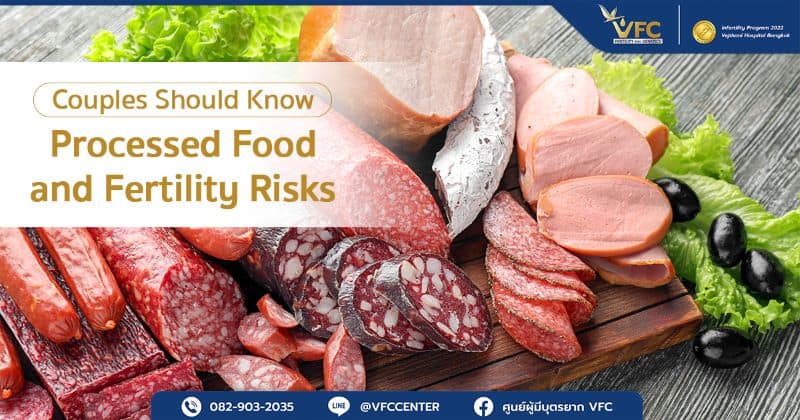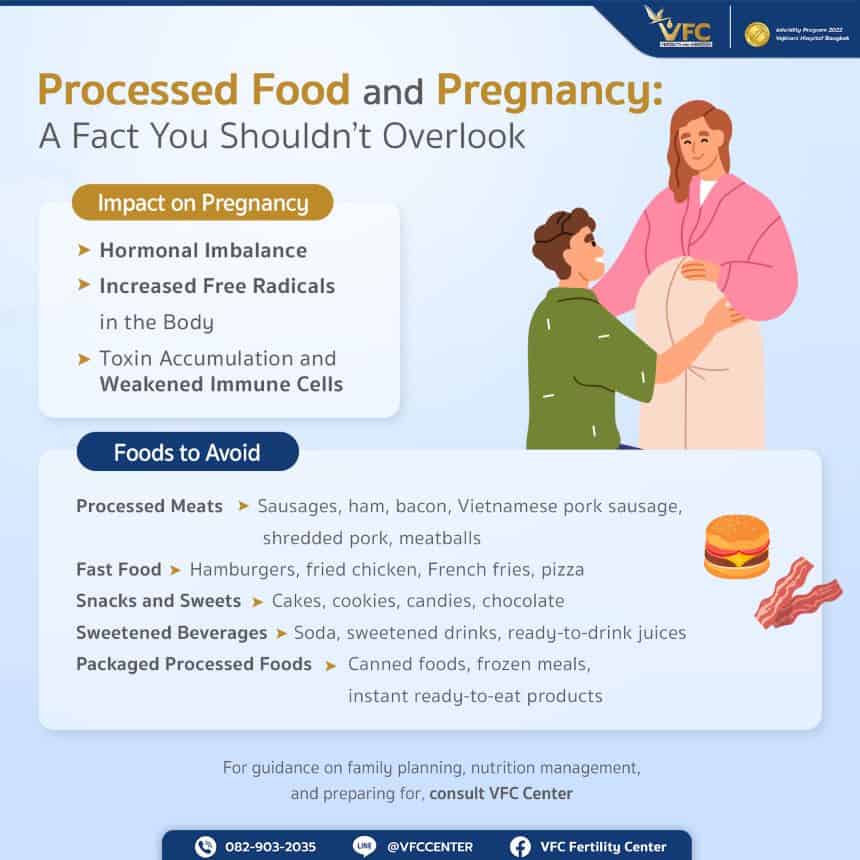
Processed foods such as processed meats, fast food, sugary snacks, sweetened beverages, and packaged ready-to-eat meals can reduce fertility by harming egg and sperm quality, disrupting hormone balance, and causing nutrient deficiencies. Couples planning to conceive should limit these foods and instead focus on nutrient-rich options like vegetables, fruits, whole grains, lean proteins, and healthy fats to support reproductive health and increase the chances of pregnancy.
For couples who are trying to have a baby, it’s well understood that diet plays a crucial role in fertility. Many make an effort to eat the most nutritious foods possible, but some may still wonder: Does processed food really affect fertility? And what types of foods should be included in a diet to support conception? Let’s help clarify these concerns.
What Are Processed Foods?
Processed foods are those that have undergone various treatments, ranging from basic processing, such as washing and cutting, to advanced processes involving chemical additives to enhance color, flavor, taste, and shelf life. These foods are often high in sugar, fat, and salt, which can impact long-term health.
Additionally, consuming processed foods can disrupt the body’s balance, leading to changes in internal systems, especially the hormonal system, when trying to have a baby diet, thus playing a key role in reproduction. It can also cause deficiencies in essential nutrients such as vitamins, minerals, and fiber, affecting fertility.

Processed Foods and Fertility: Do They Really Affect Pregnancy?
Struggling to conceive due to processed foods is a real concern. Processed foods can interfere with the mechanisms of pregnancy in several ways:
Hormonal Impact
Processed foods are often high in trans fats and added sugars. These components can disrupt the body’s hormonal balance, particularly those related to reproduction, such as estrogen and testosterone. This imbalance directly affects ovulation in women and sperm production in men, reducing fertility and the quality of reproductive cells.
Increase in Free Radicals
Processed foods may contain chemicals that increase free radicals in the body. Free radicals are unstable molecules that can damage various cells, including eggs and sperm, lowering the chances of fertilization and pregnancy.
Toxin Accumulation
Preservatives and other chemicals in processed foods can build up in the body over time. This accumulation can impair the immune system and disrupt hormonal balance, affecting the function of reproductive organs and the production of healthy eggs and sperm, ultimately decreasing the likelihood of conception.

Processed Foods to Avoid When Trying to Have a Baby
For couples planning to conceive, avoiding or reducing processed foods can improve fertility and increase the chances of pregnancy. Key foods to limit include:
Processed Meats
Processed meats such as sausages, ham, bacon, cured pork, shredded pork, and meatballs often contain high levels of preservatives, artificial colors, sodium, nitrates, and nitrites. These additives can negatively affect the quality of eggs and sperm.
Fast Food
Fast foods are typically high in saturated fats and added sugars, including burgers, French fries, pizza, and fried chicken. While these foods are calorie-dense, they are low in essential nutrients, depriving the body of vital vitamins and minerals needed for reproductive health.
Snacks and Sweets
High-sugar treats such as cakes, cookies, candies, and chocolate can cause rapid spikes in blood sugar levels, which may disrupt hormone balance and reduce fertility.
Sugary Beverages
Soft drinks, sweetened teas, and pre-packaged fruit juices often contain high amounts of sugar and artificial additives. Excessive consumption can lead to insulin resistance and negatively affect ovarian function in women
Packaged Processed Foods
Canned foods, frozen meals, and ready-to-eat meals that require microwaving often contain high sodium and other chemicals that can interfere with overall body function, including the reproductive system.
What Couples Planning to Have a Baby Should Eat?
Eating a diet that supports fertility is just as important as avoiding processed foods. Choosing the right foods can help improve egg and sperm quality and increase the chances of a successful pregnancy. Recommended fertility-boosting foods include:
Vegetables and Fruits
Focus on green leafy vegetables and fruits rich in vitamins C, E, and folate, such as broccoli, spinach, oranges, lemons, bananas, and avocado. These nutrients act as antioxidants and help improve egg production and sperm quality.
Foods High in Unsaturated Fats
Unsaturated fats are healthy fats essential for hormone balance. Include foods like avocados, flaxseeds, nuts, and olive oil in your diet. Fatty fish from deep seas, such as salmon, tuna, and sardines, are rich in omega-3 fatty acids, which support hormone health and reduce inflammation.
Plant-Based and Animal Proteins
High-quality proteins are crucial for egg and sperm development. Include sources like tofu, beans, chicken, and fish to support reproductive health.
Whole Grains
Whole grains such as brown rice, oats, and quinoa provide sufficient dietary fiber, promote healthy digestion, and help maintain stable blood sugar levels.
Water
Staying hydrated is vital for overall body function. Aim to drink at least 8–10 glasses of water daily to support all bodily systems, including reproductive health.
Maintaining overall health, especially through proper nutrition, plays a crucial role in improving fertility. At VFC Center, we provide guidance and support for couples preparing for pregnancy. Our experts offer personalized advice on fertility-boosting foods for both eggs and sperm, along with safe pregnancy preparation strategies, helping you feel confident and ready for parenthood.
Article by Dr. Nantnapas Porosiyanon
For consultations or appointments, contact:
VFC Center – V-Fertility Center
Hotline: 082-903-2035
LINE Official: @vfccenter

The team of specialists in obstetrics and gynecology and reproductive medicine





No Comments
Sorry, the comment form is closed at this time.